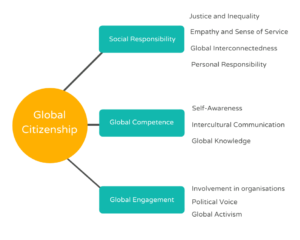Our Approach
Move The World believes that focussed Global Citizenship education will build the capacity of young people around the world and empower them to identify and tackle challenges they face at a local level, whilst understanding the effects on a global level.
All our programming strives to create opportunities and experiences for young people to build these key skills. We design and deliver practical and engaging programmes based on Experiential Learning Theory and our Global Citizenship Framework.
Our work provides a structured and coherent ‘entry point’ into civic and social action, within a safe and supportive environment.
Our Theory of Change
We are committed to:
![]()
SDG FOCUS: 4.7…
by 2030 “ensure all learners acquire knowledge and skills needed to promote sustainable development, including among others through education for sustainable development and sustainable lifestyles, human rights, gender equality, promotion of a culture of peace and non-violence, global citizenship, and appreciation of cultural diversity and of culture’s contribution to sustainable development.”
Global Citizenship Framework
 Practical social action opportunities integrated into the standard national curriculum is an effective way to enhance student academic development and to provide a pathway to empower students to become responsible global citizens.
Practical social action opportunities integrated into the standard national curriculum is an effective way to enhance student academic development and to provide a pathway to empower students to become responsible global citizens.
There is no one commonly accepted definition of global citizenship, yet global citizenship is understood as a multi-dimensional construct that entails: social responsibility, global competence and global civic engagement, all of which are interrelated. (Ogden, 2012)
We have adapted this conceptual model to provide a framework upon which our curriculum is designed and programmes are monitored.
Curriculum themes: Sustainable Development Goals
Our curriculum uses the Sustainable Development Goals as themes for engagement. The UN’s 2015 – 2030 SDG’s are the world’s best plan to build a better world for people and our planet. The goals recognise that ending poverty must go hand-in-hand with strategies that build economic growth and address a range of social needs including education, health, equality and job opportunities, while tackling climate change and working to preserve our ocean and forests.
We believe that by using the SDGs as themes for our curriculum, we are able to raise awareness of young people of the challenges the world faces, in their communities and beyond. Our Get Global programme introduces each SDG and provides opportunities for youth to engage, explore and further understand the goal and their responsibility within it. Get Global 1 focusses on SDG 1-6.

Experiential Learning Theory

At the heart of all learning is the way we process our experiences, especially our critical reflections on our experiences. Our programmes are designed with experiential learning theory in mind as a main approach to student-centred learning for a sustainable future.
Experiential learning engages students in critical thinking, problem solving and decision making in contexts that are personally relevant to them. This approach to learning also involves making opportunities for debriefing and consolidation of ideas and skills through feedback, reflection and the application of the ideas and skills to new situations.
For more information about our approach please contact us.

